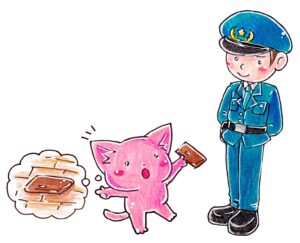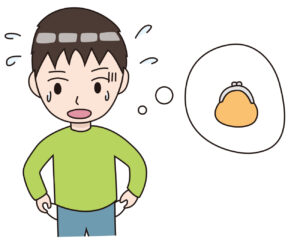When you lose your wallet, the first thought that comes to mind is, “Will I ever get it back?” In Japan, there’s an astonishingly high chance that lost items will be returned to their rightful owners. This phenomenon is so remarkable that it often draws admiration from around the world.
The secret lies in Japan’s unique culture, legal systems, and societal structures. In this article, we’ll explore why wallets tend to make their way back to their owners in Japan. We’ll also share specific examples and insights into Japan’s exceptional safety. Plus, we’ll provide practical steps for what to do if you lose your wallet and tips to prevent it from happening.
By the end of this article, you’ll have a deeper understanding of Japan’s culture of returning lost items and the peace of mind that comes with it.

Why Do Lost Wallets Return to Their Owners in Japan?
In Japan, the high likelihood of lost wallets being returned is deeply tied to the country’s systems and culture. Specifically, the “koban” (police boxes), the “Lost Property Act,” and a culture that values honesty play crucial roles.
The Role of Koban and the Lost Property Act
Japan’s koban network is the backbone of its lost-and-found system. These small police stations serve as hubs for reporting and managing lost items efficiently.
Legally, the Lost Property Act requires finders to report discovered items, with penalties in place for non-compliance. This legal framework encourages people to take action when they find someone else’s belongings.
Once a lost item is reported, it’s meticulously recorded and tracked, making it easier to reunite items with their owners. This systematic approach is a key reason for Japan’s impressive return rates.
Cultural Norms That Encourage Honesty
Honesty and respect for others’ property are deeply ingrained in Japanese society. This mindset is influenced by religious teachings such as Buddhism and Shintoism. In particular, the Buddhist concept of “cause and effect” discourages dishonest actions.
Additionally, moral education in schools emphasizes the importance of returning lost items. As a result, when people find something that doesn’t belong to them, it’s natural for them to hand it over to authorities.
These cultural norms are a driving force behind Japan’s high return rates.

Comparing Lost-and-Found Rates Between Japan and Other Countries
Hearing about Japan’s high return rate naturally raises the question, “How does it compare to other countries?” Let’s dive into some data and discuss the factors behind these differences.
Japan’s Exceptional Return Rates in Numbers
According to Tokyo Metropolitan Police statistics, approximately 80% of wallets lost in Tokyo in 2023 were returned to their owners. This figure is extraordinarily high and has been widely reported by international media.
In contrast, return rates in other countries vary widely. In the United States, for example, the average return rate is around 30%, with significant variation depending on the city. In Europe, the figure is slightly higher but still lags behind Japan at roughly 50%.
These comparisons highlight Japan’s remarkable performance in returning lost items.
What Makes Japan Different?
There are two key factors that set Japan apart:
1. Cultural Differences
In many countries, the idea of “finders, keepers” is more prevalent, whereas in Japan, keeping something that doesn’t belong to you is socially unacceptable. This cultural distinction significantly impacts return rates.
2. Safety and Legal Framework
Japan’s low crime rates reduce the risk of lost items being stolen. Additionally, comprehensive laws like the Lost Property Act make it easy and safe for finders to report lost items, further encouraging their return.

What to Do If You Lose Your Wallet in Japan
Even in Japan, where lost items are often returned, it’s important to take proactive steps. Here’s a detailed guide on what to do if you lose your wallet, as well as the rules for reporting found items.
Steps to Take When You Lose Something
1. Stay Calm and Pinpoint the Location
First, try to remember where you might have lost your wallet. Was it on public transport, at a store, or on the street? The location will determine your next steps.
2. Report It to the Nearest Koban
Head to the nearest koban and provide the following information:
- Wallet details (color, brand, size)
- Contents (cash amount, types of cards, etc.)
- Approximate time and place of loss
The officer will create a “lost item report” with a tracking number, allowing you to check the status of your case later.
3. Contact Relevant Facilities
If you lost your wallet in a specific location like a train station or a mall, contact their information desks. Many train companies have their own lost-and-found systems, so it’s worth following up directly.

Rules for Reporting Found Items
1. Finder’s Reward
Under the Lost Property Act, finders are entitled to a monetary reward from the owner, typically 5–20% of the item’s value.
2. Ownership Transfer
If an item isn’t claimed within a certain period (usually three months), ownership can transfer to the finder. However, this only applies if the finder has reported the item.
These clear rules make it easier for finders to do the right thing without hesitation.
How Japan’s Lost-Item Culture Provides Peace of Mind
Japan’s culture of returning lost items offers a sense of security that’s appreciated both domestically and internationally. Let’s explore this unique aspect of Japanese society.
Praise from Around the World
Japan’s system has been lauded worldwide. Stories of tourists losing wallets and having them returned intact often go viral, showcasing the country’s exceptional honesty.
Example
A tourist who lost their wallet in Shibuya later retrieved it from a koban with all contents untouched. Sharing this story on social media sparked widespread admiration and reinforced Japan’s reputation for trustworthiness.
When Lost Items Don’t Come Back
Unfortunately, not all lost items are returned. Common reasons include:
1. Difficult-to-Find Locations
Items lost in less frequented areas or on crowded trains may take longer to be reported or retrieved.
2. Dishonest Finders
Although rare, some finders may fail to report lost items, especially when they contain large sums of cash.
Tips to Avoid Losing Your Wallet
To minimize the risk of losing your wallet:
- Use a Strap: Attach your wallet to your bag or yourself for added security.
- Check Regularly: Make it a habit to confirm your wallet’s location during outings.
- Separate Cash and Cards: Reduce the risk of losing everything by keeping them in different places.

Conclusion
In Japan, a unique combination of systems, culture, and laws ensures that lost wallets are often returned. While this cultural phenomenon is a testament to Japan’s safety and trustworthiness, it’s still important to take precautions.
Understanding this remarkable system not only provides peace of mind but also deepens appreciation for Japan’s societal values. Whether you’re a resident or a traveler, knowing what to do and how to prevent loss will enhance your experience in Japan.


